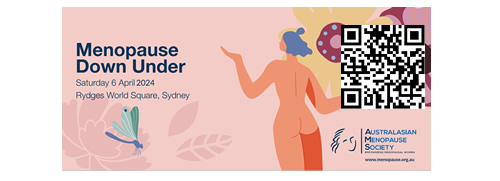9 January 2019:
A study analyzed SWAN data to document decrease in hormone therapy initiation and continuation; many younger symptomatic women needlessly went without relief
Few studies have been as responsible for changing the course of treatment of menopause symptoms to the extent that the Women's Health Initiative (WHI) did. The number of women taking hormones dramatically dropped as a result of the study, leaving many women to needlessly abandon a treatment that offered symptomatic relief.
In the aftermath of the 2002 WHI announcement that estrogen-progestin therapy was being halted prematurely because of safety concerns, the prevalence of prescription hormone therapy (HT) declined immediately and still today is lower than pre-WHI levels. According to a new study that analyzed more than 17 years of data from the 3,018 participants in the Study of Women's Health Across the Nation (SWAN), HT initiation dropped from 8.6% pre-WHI to 2.8% post-WHI. Similarly, the corresponding decrease in HT continuation was 84.0% to 62.0%.
Such decreases occurred across a wide range of participant subgroups, including younger women and those with more vasomotor symptoms (VMS) for whom HT provided the greatest relief with the least amount of risk. Hormone therapy use recommendations have been modified since 2002 as a result of greater education and the realization that some of the WHI results were misinterpreted as applying to all women. Today's guidelines allow for greater flexibility to reinforce the benefits of individualized treatment based on the age of the woman and the number of years since menopause.
Although this study is not the first to document the decline in HT use as a result of the initial WHI findings, it differs by distinguishing between the declines in initiation versus continuation. It also is one of the only known studies to document reasons for discontinuation, concluding that many symptomatic women forego HT because of concerns about study findings that are not truly applicable to them. This specific group includes women aged in their 50s when VMS symptoms, such as hot flashes, are most prevalent, but the risks of HT are lower.
Abstract
Objective:
To better understand how to educate patients and providers about study findings relevant to treatment guidelines, we assessed pre- versus post-Women's Health Initiative (WHI) differences in menopausal hormone therapy (MHT) initiation and continuation and their correlates, and in women's reasons for initiation and discontinuation.
Methods:
We analyzed survey data from up to 14 approximately annual visits over 17 years (1996-2013) from 3,018 participants in the Study of Women's Health Across the Nation, a prospective cohort study. We used logistic regression to compare pre- versus post-WHI associations of covariates with MHT initiation and continuation, and to compare pre- versus post-WHI reasons for initiation and continuation.
Results:
MHT initiation dropped from 8.6% pre-WHI to 2.8% post-WHI (P < 0.0001), and the corresponding decrease in MHT continuation was 84.0% to 62.0% (P < 0.0001). Decreases in MHT initiation and continuation occurred across a range of participant subgroups, consistent with wide dissemination of post-WHI recommendations. However, contrary to current guidelines, we found large declines in MHT use in subgroups for whom MHT is often recommended, that is, younger women and those with more vasomotor symptoms. Post-WHI, women's reasons for MHT initiation and discontinuation reflected concerns highlighted by WHI results. The largest declines in initiation reasons were for reducing risks of osteoporosis and heart disease, whereas the largest increases in discontinuation reasons were for media reports and provider advice.
Conclusions:
Immediate post-WHI recommendations for MHT use were widely adopted. MHT risks documented in older women, however, may have led younger symptomatic women to forgo MHT for symptom relief.
Reference
Crawford SL, Crandall CJ, Derby CA, El Khoudary SR, Waetjen LE, Fischer M, Joffe H. Menopausal hormone therapy trends before versus after 2002: impact of the Women's Health Initiative Study Results. Menopause. 2018 Dec 21. doi: 10.1097/GME.0000000000001282. [Epub ahead of print]






